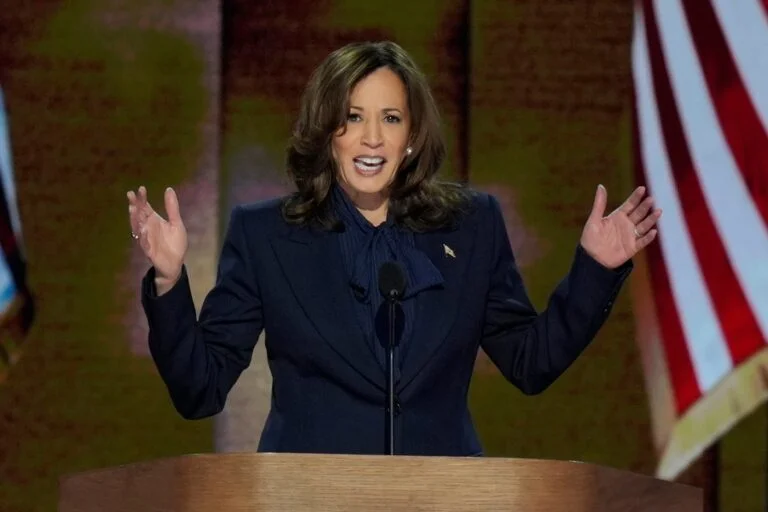September 3, 2024

Kamala Harris’ speech at the Democratic National Convention was a masterclass in storytelling. I am a little bit obsessed when it comes to watching the DNC because I like to watch these events to analyse if the speakers use stories effectively or not.
I thought my analysis of Harris’ speech could be useful for any leader, especially when it comes to communicating values. This could be either your own personal values or your organisation’s values. And you would hope there is a strong correlation between the two.
The Speech
Harris started with a few thank you statements including one for her husband, Doug. It was their 10th wedding anniversary and a nice personal start.
She then moved on to the personal story of her background which went for about 5 minutes. But instead of it being a timeline (most people confuse timelines with stories 🤦🏻♀️) it consisted of many stand-alone micro-stories.
Micro-Stories
The first story was about her mother. At the age of 19, she moved from India to California with a dream to cure breast cancer.
Her next micro-story was about growing up where she shared that her family moved a lot. She recalled,
‘I always remember the big Mayflower truck packed with all our belongings ready to go’.
Details like this may not seem important in a story but it helps to paint a picture for the audience and adds authenticity.
She followed this with some of her fondest memories from her childhood. She mentioned trips to the park where her mother would always say,
‘Stay close’.
Yet, her father would always say,
‘Run Kamala run. Don’t be afraid. Don’t let anything stop you’.
Being very specific about what your parents said to you is an extremely effective way of giving people an insight into how you operate the way you do and why.
A bit later she talked about her mother’s struggles managing a single parent family. Harris went on to name the specific people that helped her mother.
‘Mrs Shelton who ran the daycare below us and became a second mother to us. Uncle Sharman, Aunt Mary, Uncle Freddie and Aunt Chris. None of them family by blood but all of them family by love’.
When you name specific characters in your story it adds a greater richness and depth. It has significantly more impact than saying something vague like,
‘The lady who ran the day care centre and other friends that we called Aunties and Uncles’.
Harris also quoted her mother’s favourite bit of advice to her sister and herself.
‘Never do anything half-arsed’.
She followed this with,
‘And that is a direct quote.’
The power in this method is that the message comes from her mother not Harris.
In the micro story about her best friend Wanda, she shared how she came to live with them because she was being sexually abused by her Stepfather. She used this story to explain her primary motivation for becoming a prosecuting lawyer – to protect people like Wanda.
Throughout her speech, she often referred back to specific advice from her mother. If you watch the speech in its entirety, you will notice the different tone she uses when she is sharing personal stories as opposed to when she covers policy statements.
Links to the Speech
You can watch the full 40 minutes here or feel free to only watch the snippets below that I have discussed.
- 4:44 – 9:30 – Stories about her upbringing
- 9:40 – 10:55 – Story about her childhood friend Wanda
- 22:26 – 23:05 – Refers to her mother and a lesson she gave her
- 37:28 – 37:55 – Refers to her mother and another lesson she gave her
I would love to hear your thoughts on other great speeches you have heard that have used storytelling.
P.S. Don’t think for a moment that Kamala Harris did not get professional help on her use of stories and then practised, practised and practised those stories. Storytelling is a skill that you can learn and I can help with that. It’s also a skill we can all get better at. If this is something you are interested in then I have two upcoming public workshops coming up later this year on Strategic Storytelling and Powerful Presentations. Or feel free to contact us to discuss an in-house workshop for your team.